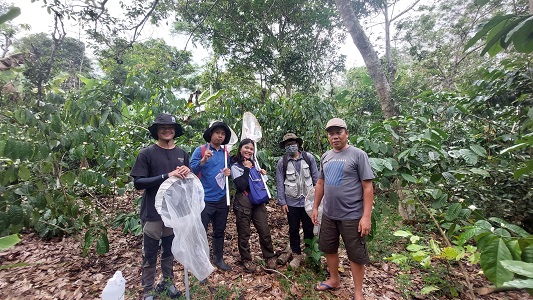The IPB University Entomology Team Conducts Research on Pests and Diseases of Coffee Commodities in order to TEEB Agrifood Indonesia

IPB University conducted research on identifying pests and diseases in coffee commodities within the framework of The Economics of Ecosystems and Biodiversity for Agriculture and Food Initiative in Indonesia (TEEB Agrifood Indonesia) project. This research was carried out in Bandung Regency, West Java and Tanggamus Regency, Lampung which lasted for one month (June-July 2023).
TEEB Agrifood Indonesia or Ecosystem Economics and Biodiversity for Agriculture and Food Initiatives in Indonesia is a collaborative project between the Faculty of Economics and Management (FEM) IPB University and the United Nations Environment Program (UNEP) and the National Development Planning Agency (Bappenas).
This activity of observing coffee plant pests and diseases involved lecturers and eight IPB University students from the Department of Plant Protection, Faculty of Agriculture. The research implementation was directly accompanied by the lecturer in charge, Dr Purnama Hidayat who is also an expert on plant pests and diseases at IPB University.
"The purpose of this research is to obtain information data on insect biodiversity (diversity) in coffee plants with agroforestry (AF) and non-agroforestry (Non AF) garden types, obtain attack intensity data and PBKO pest populations and obtain data on parasitoid insect species and predators. which acts as a natural enemy of the coffee berry borer (PBKO). The results of this research will eventually be published in an international journal," said Dr Purnama Hidayat.
In this research, the IPB University entomology team carried out several activities while in the field, one of which was the installation of malaise traps at several location points. The implementation of the TEEB Agrifood Indonesia Project is spread over two provinces with different coffee varieties, Arabica Coffee in Bandung Regency and Robusta Coffee in Tanggamus Regency.
Sampling in Bandung Regency was spread over seven villages in five districts. Meanwhile in Lampung Regency, samples were distributed to eight villages in four sub-districts. The total sample in each district is 20 plots.
Following up on the samples obtained while in the field, the IPB University entomology team will then identify parasitoid and predatory insects from observations of malaise traps and sweeping nets. In addition, the team also calculated the intensity of pest attacks on coffee cherries from each plantation plot to find out the level of damage caused by the coffee berry borer (PBKO).
"It is hoped that through this research, PBKO pest problems in the field can be overcome by obtaining information about the pest's natural enemies. So that the use of biological control can continue to be applied to coffee cultivation and the use of pesticides in the field can be suppressed," concluded Dr Purnama Hidayat. (*/Rz) (IAAS/Hap)



